U.S.-Cuba change brings out anti-Castro protesters in Miami
MIAMI -- Waving flags and chanting "Obama, traitor," anti-Castro protesters gathered Saturday in a Little Havana park in a show of opposition to the president's plan to normalize relations with Cuba.
A couple hundred people listened to speeches, and many carried Cuban and American flags. Some speakers emphasized unity of the Cuban-American community and said there is not a generational divide, even though the majority in the crowd was older.
Others blasted President Obama. "The worst infamy is the pretext he used: He says it's to help the Cuban people," former U.S. Rep. Lincoln Diaz Balart said to chuckles from the crowd.
Several chants rang out among protesters: "No more flights to Cuba!" ''Viva Cuba libre!" and "Freedom for all the political prisoners."
And about five women held a large sign proclaiming: "Obama's message to Castro: Imprison Americans and get 3 spies and an embassy."
Several protesters expressed disappointment with demonstration turnouts since the announcement this week of renewed U.S.-Cuba ties.
"The mentality is, 'Hey, we're going to be able to buy Cuban cigars and rum.' Well, it's not a happy thing for us," said Armando Merino, 68, who was born in Cuba and came to the U.S. at age 14. "I'm here because for the Cuban people, my family in Cuba, they are not able to protest."
In Havana Friday, "CBS Evening News" anchor Scott Pelley spoke with some young Cubans at the National University of the Arts who are studying with the Chicago Jazz Philharmonic about the change.
"This is a great opportunity to get together, to learn about this culture, to learn about the people, and I hope that that relationship [will] keep growing with the time," one student named Wendy told Pelley.
"When the blockade will finish, I think we will be more close to the freedom that you always are talking about," Ernesto told Pelley.
In Miami Saturday. Irene Oria, 71, came to protest with her husband, Giordano, 77. Of Mr. Obama's announcement on thawing relations, she said, "It's not the time to do it this way."
"With the Castros? No, I'm sorry," Oria said, adding that the conditions that fueled her decision to leave Cuba at age 24 still exist.
Miami is no stranger to protests from the Cuban community. Of the estimated 2 million Cubans living in the United States, the majority resides in South Florida and many remain closely attuned to developments on the island.
Thousands took to the streets after federal agents seized Elian Gonzalez in a prolonged international custody dispute and returned him to Cuba in 2000. The protesters set bonfires in the road and stopped traffic. Police responded in riot gear with tear gas and made more than 350 arrests.
Hundreds paraded through the streets of Little Havana when Fidel Castro ceded power to his brother Raul in 2006.
And in 2010, Cuban-born singer Gloria Estefan led tens of thousands in support of the Ladies in White, a group of Cuban mothers and wives of 75 dissidents arrested in the 2003 government crackdown there.
But protests and parades have become smaller and more sporadic.
"I think there are a lot of people sitting on the sidelines, tired," said Andy Gomez, a Cuba expert and retired University of Miami professor.
